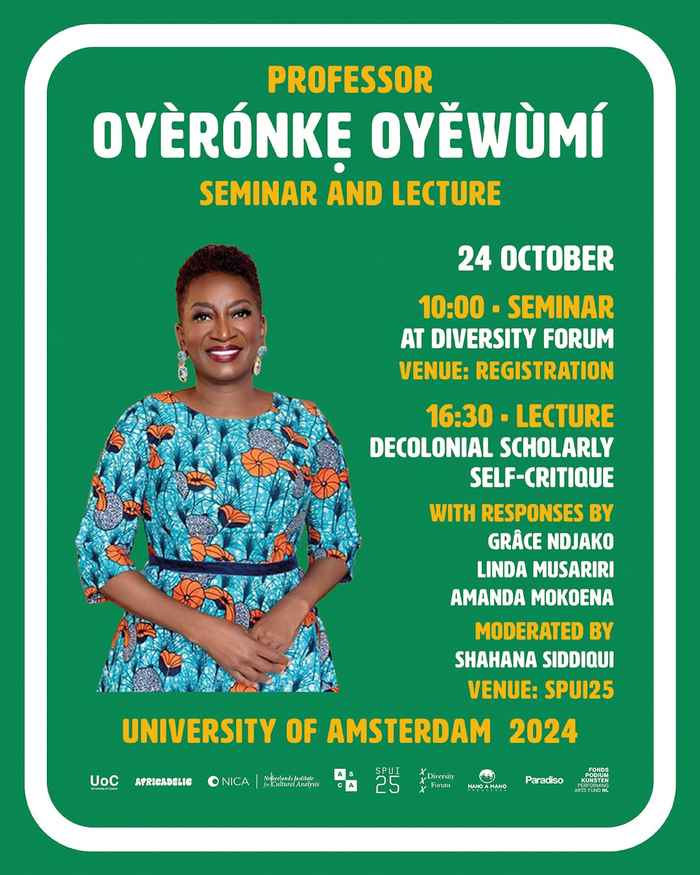Rethinking Gender Through African Lenses
- Date
- 24 October 2024

Professor Oyèrónkẹ́ Oyěwùmí's is Full Professor of Sociology of Gender, Knowledge and Culture at Stony Brook University. She is of Nigerian background and her fields of study include (Post) Colonial Studies and Modernities, and African studies. Her first book, The Invention of Women: Making an African Sense of Western Gender Discourses (1997), has been groundbreaking and highly influential for various scholarly movements, such as Sociology, (Cultural) Anthropology, the Decolonial School of Thought, African-, Cultural-and Gender Studies. Her work is read in many courses across the Humanities and Social Sciences, including in the Netherlands. In 2021, she won the distinguished Africanist Award of the African Studies Association.
Co-thinking session on Decolonial Scholarly Self-Critique with Professor Oyèrónkẹ́ Oyěwùmí; number of participants: 25.
If you want to participate, please send an email to cgdiversity@gmail.com
Date: 24 October, 2024 | Time: 10:00-13:00 hrs (CET) | Venue: CREA (Nieuwe Achtergracht) – Room 3.12 | Credits for MA and RMA students: 1EC
The seminar is open for to all to register, please send an email to cgdiversity@gmail.com. We will then share readings and ask you to write a brief reflection on them. If there are too many registrations, we will ask you to let us know that you wrote such a reflection and want to come well prepared for the workshop before 19 October 2024, 10 AM. If there are then still too many registrations, we will draw lots and let you know on 20 October. Further explanation of the procedure after registration.
The workshop will address how students and scholars grapple with issues surrounding (colonial) research methods and the position of scholars in themes concerning the global South. These are issues that are of great importance to all scholars, and in particular to scholars of color, trained in Western and Westernized institutions. We will address questions regarding positionality, invisibilised hierarchies (in academic research and discourses), erased epistemologies (erased through academic practice) and academic freedom. These themes are relevant for philosophers and literary and cultural analysists in general, not only for scholars of color. There is increasing awareness of the histories of coloniality and whiteness in scholarship and academic attitudes, and we expect a large group of especially young scholars to want to reflect on these themes together.
Proposed no. of ECTS: 1 ECTS for ReMa students (for preparing, attending and actively participating in the workshop).
Open to (please indicate): ReMa students | PhD candidates | Academic Staff (Open to all three categories.
Contact info organizers (for registration for the event): nica@hum.leidenuniv.nl
Registration deadline: 10 October 2024
Other activities with prof. Oyèrónkẹ́ Oyěwùmí, and co-organised with ASCA and NICA:
See Africadelic – Celebrating International Africa Day and
24 October: Disrupting Colonial Practices of Gender - SPUI25
25 October: Fela Day, Falz the Bahd Guy + Oyèrónkẹ́ Oyěwùmí | Paradiso
Lecture and Panel Discussion: Rethinking Gender Through African Lenses
24 October 2024, 17:00 hrs. at Spui25
Registration: https://www.spui25.nl/programma/rethinking-gender-through-african-lenses
Professor Oyèrónkẹ́ Oyěwùmí offers a transformative perspective on gender, challenging Western ideas and its global application. The pioneering sociologist will dive into her most influential research, discussing how African perspectives can reshape our understanding of gender, women’s rights, and knowledge production.
In her seminal work, The Invention of Women: Making an African Sense of Western Gender Discourses (1997), Oyěwùmí argues that the concept of gender, as understood in the West, is not universal and that imposing it on African societies had and has harmful colonial consequences. By drawing from Yoruba culture, she reexamines how we think about identity, power, and the roles assigned to women. Together with Oyěwùmí, Grâce Ndjako, Amanda Mokoena and Linda Musariri, we discuss how Oyěwùmí’s work continues to challenge dominant narratives and inspire new approaches to gender across disciplines and cultures, highlighting the importance of reclaiming indigenous viewpoints in today’s academic and social conversations.
About the speakers
Oyèrónkẹ́ Oyěwùmí is a Professor of Sociology specializing in Gender, Knowledge, and Culture at Stony Brook University. A scholar of Nigerian origin, her research spans (post)colonial studies, modernities, and African studies. Her seminal work, The Invention of Women: Making an African Sense of Western Gender Discourses (1997), has had a profound impact on fields such as sociology, (cultural) anthropology, decolonial theory, and African, cultural, and gender studies. Her writings are widely studied in humanities and social sciences courses, including in the Netherlands. In 2021, she was honored with the prestigious Africanist Award by the African Studies Association, and recently, she co-edited Naming Africans: On the Epistemic Value of Names (2023), a volume that explores the idea that personal names serve as rich sources of historical and cultural insight, revealing layers of hidden knowledge.
Grâce Ndjako is a philosopher, author and translator. She studied Political Science and Philosophy at the University of Amsterdam and the Sorbonne in Paris. She writes for various Dutch publications such as Dipsaus Podcast, De Nederlandse Boekengids, Hard//Hoofd, De Witte Raaf and De Internet Gids. She translated Aimé Césaire’s ‘Discours sur le colonialisme’ and the poems of Nele Marian from French to Dutch. She is currently working on her PhD in Philosophy at the University of Amsterdam.
Amanda Mokoena is anthropologist-in-training interested in unsolvable existential questions of the tensions between society and science, and the impact of this divide on the natural environment and more-than-human life forms. Currently a PhD candidate in anthropology at the University of Amsterdam, she is an African Feminist and was trained at the African Gender Institute housed at the University of Cape Town, where taught the politics of knowledge production in the newly renamed African Feminist Studies department. She is a keen mountaineer from South Africa with roots in the Kingdom in the Sky- a place of snowy winters and endless mountain peaks- Lesotho. Her research is on the water-energy-food nexus in urban South Africa, with a focus on water insecurity.